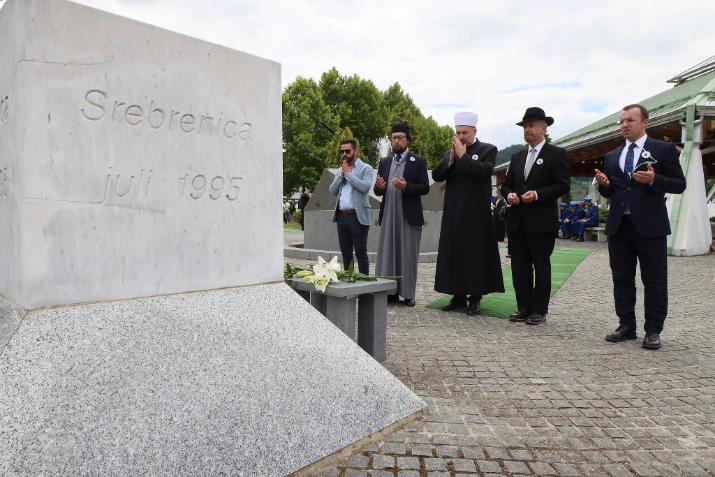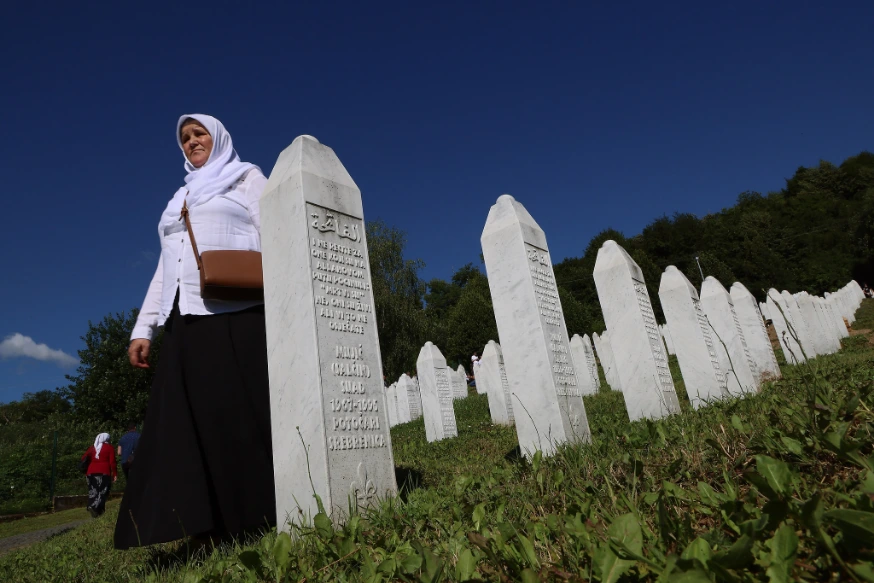
COVER: (Left to Right) Imam Pallavicini, President of the Italian Muslim Religious Community, Prof. Grabus, Mufti of Sarajevo, and Chief Rabbi Rosen, Director of International Interreligious Affairs at the American Jewish Committee, offer prayers representing the MJLC at the Srebrenica Genocide Memorial in Potočari. Photo by Amel Emric/KAICIID
The Muslim-Jewish Leadership Council (MJLC) is a group of religious leaders from two faiths and across Europe who have chosen to join forces to protect Muslim and Jewish rights and dignity in Europe and to build greater understanding and support between their communities. As religious leaders, we frequently face questions that require thought and sensitivity to assess or select a course of action we consider right and in line with our faiths. However, in certain instances there can be no doubt whatsoever. When contemplating a genocide – the murder of more than 8,000 Bosniak men and boys and displacement of thousands of unarmed Muslim civilians in July 1995 – regardless of the opaque and painful context of warfare in which it takes place, we believe that not only religious leaders but people of every faith must know it is utterly wrong and reprehensible and join both the call and the commitment to prevent it ever happening again.
As the MJLC also stood in Auschwitz-Birkenau in January this year, as a gesture of solidarity and respect for our Jewish brothers and sisters, so we stand in Srebrenica today. We are grateful for the welcome and support of the Rais al-Ulemma, Husein Kavazović and Igor Kožemjakin, hazzan of the Jewish Community of Sarajevo as well as the hospitality of Prof. Nedžad Grabus, Mufti of Sarajevo and Dr. Mustafa Ceric. We recognize and mourn the terrible wrongs committed against Bosnian Muslims on the basis of their religious and ethnic identity. Whether the targets of such atrocities are Jews, Muslims or followers of any other religion, we utterly condemn objectification and discrimination against people of a particular faith, ethnicity or culture. If indulged by society, these are the first steps which can lead to hate crimes on a huge scale. At a time when Europe once again faces war upon its territories and military strength determines the fates of whole populations and what is reported about them, we see that observing the most stringent standards of international law is vital to preventing the killing of innocents, torture of prisoners and destruction of culture, faith and history once again. We call for all European citizens, and particularly those in positions of responsibility in their countries, to be vigilant against genocidal tendencies in Ukraine. We call upon them to seek for ways to stop violence and suffering, to shelter and protect victims of war and forced migration, to protect holy sites and places of cultural significance, and to take a stand to uphold common values. These include the democratic principles of justice, equality, a free press, freedom of belief and its practice and protection of minorities. They also include the human responsibilities all our faiths prompt us to hold dear: the duty to make peace, to support and defend those in need, to seek and tell the truth and to strive to understand and demonstrate compassion and respect for one another. Let us resolve to follow and uphold these principles, even and especially when it is hard to do so.
 A mourner at the Srebrenica Genocide Memorial, Potočari” Photo by Amel Emric/KAICIID
A mourner at the Srebrenica Genocide Memorial, Potočari” Photo by Amel Emric/KAICIID
Today we honour the memory of those who lost their lives in and around Srebrenica and the families who suffer and miss them. We pray for the stabilization and healing of Bosnian society, and for a lasting peace throughout the region. We trust that we, together with the other religious representatives gathered here, may be messengers and enablers of that peace. We call for politicians and community leaders to commit and continue to work towards a safe, neighbourly and flourishing society and we entrust ourselves and those for whom we mourn into G-d’s everlasting care.